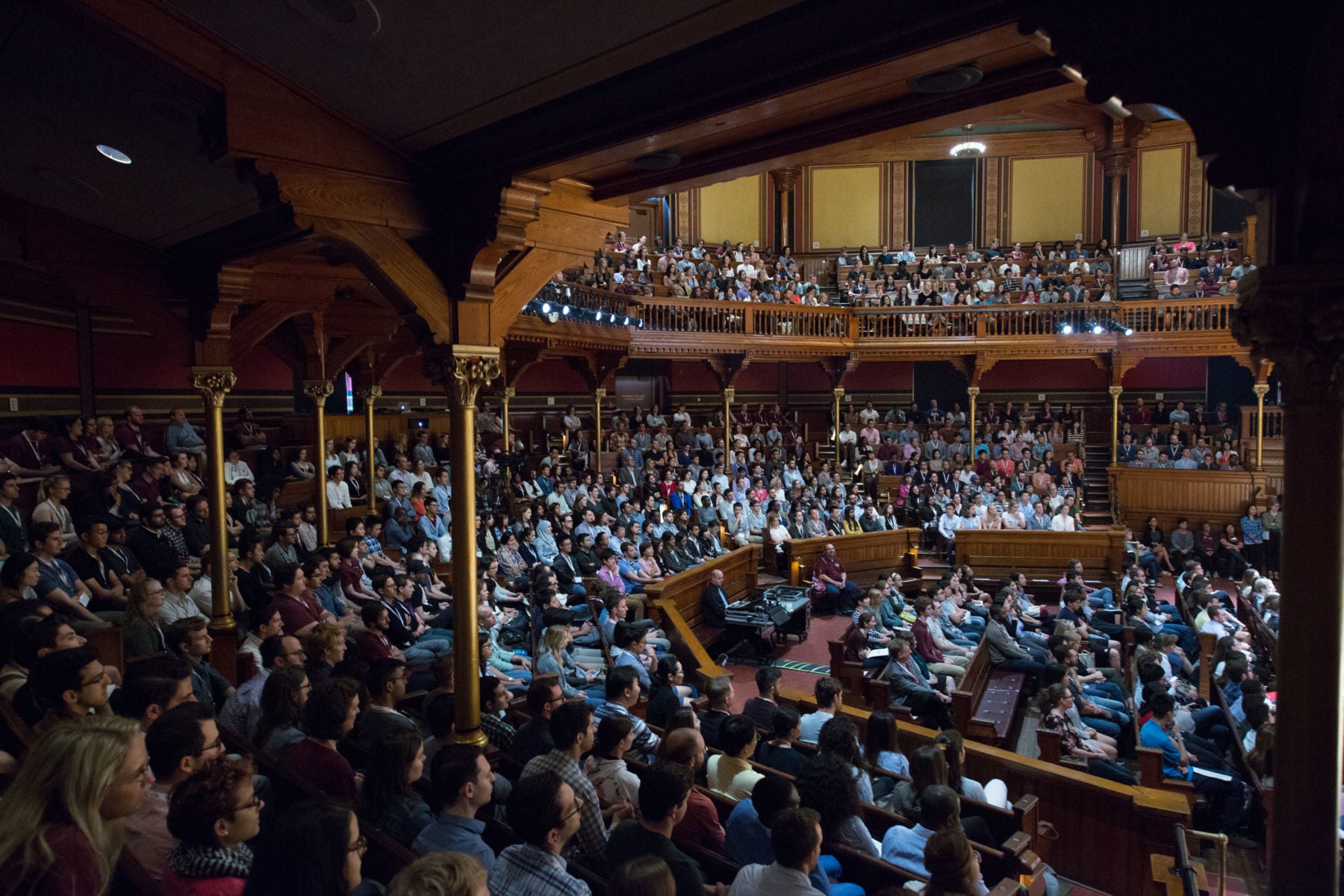In his first address to incoming students since he was named dean of Harvard Law School on July 1, John Manning ’85 welcomed this year’s 1L class at Sanders Theatre on Aug. 29.
“This is an important time to be a lawyer,” Manning said. “In a complex and often frightening world, good lawyers make indispensable contributions to law and justice.”
Manning, who began his first year at HLS 35 years ago, used his talk to share four lessons that he wished he had known on his first day of law school.
#1: “Don’t worry about what you don’t know.”
Manning recalled that, when he started law school, he was scared that he didn’t get what he was supposed to be learning. As the first in his family to graduate from college and the first to go to law school, Manning said he didn’t know many lawyers, and, for his first semester, it seemed as if everyone around him grasped what was going on in a way that he didn’t. He told students that they’re here to learn what they don’t know yet. He urged them to ask questions, seek out mentors, connect with faculty and not worry too much. “The bottom line is that you’ll all learn what you need to know, and you’ll all do very very well in your careers,” he said. “There are lots of good ways to do this thing called law school. And your job is to find the one that’s right for you.”
#2 “Law school is not just about learning stuff; it’s about learning how to think.”
While learning rules is an important part of legal training, Manning said, it is far more important for students to learn to think like a lawyer –to break apart a problem into its essential parts and to see what’s really at stake. “It’s almost impossible to have a deep understanding of law if you don’t think about it critically,” he said. “[A]ll lawyers—whether they’re in high public office or engaged in the everyday work of representing clients—are responsible for the integrity of the legal system. Law is powerful. It has great capacity for good and for ill. And, if we’re doing our job right, we lawyers must always be prepared to question, criticize, and look behind decisions made in the name of the law. That is a high calling of our great profession.”
#3 “Lawyers disagree with each other; it’s part of our job.”
Manning noted that the adversarial system of justice is set up precisely so that lawyers have to deal with the best arguments against them all the time. Learning how to disagree with one another is an important part of a legal education. “One thing I know for sure: If you don’t take the other side seriously, if you dismiss it, if you treat it as silly, if you deem it unworthy of your consideration, you will not hear the strength in the other side’s arguments. And you will not know what points you most need to answer in order to persuade someone who may or may not start from the same assumptions as you do.” He also said lawyers must learn to frame those disagreements with mutual respect. “[I]t is our job here, at Harvard Law School, to debate vigorously and to have the courage of our convictions. But we also know that we must leaven that courage with empathy. And we must never, ever denigrate the humanity of others.”

#4 “There are many many ways to be happy in this profession. And your job, starting now, is to find the path that best suits you.”
When Manning came to law school, he planned to become a corporate attorney. But after clerking on the D.C. Circuit, he discovered that what he really cared about was the rule of law and the constitutional system of checks and balances. “I would never have guessed that the rule of law would be the love of my professional life, or that I would be a law professor and a dean. Indeed, I would have bet heavily against all of that,” he said. “What I’ve seen during my 35 years in this business is that the happiest lawyers are often the ones who have been most open to possibilities they never thought possible.”
A public-law scholar with expertise in statutory interpretation and structural constitutional law, Manning has been on the HLS faculty since 2004, following a decade at Columbia Law School. His career has included stints in the U.S. Department of Justice as an attorney in the Office of Legal Counsel and the Office of the Solicitor General. He has published more than 40 articles in leading law journals and is co-editor of two leading casebooks, Hart & Wechsler’s Federal Courts and the Federal System and Legislation and Regulation. He served as a law clerk to both Justice Antonin Scalia of the U.S. Supreme Court and Judge Robert H. Bork of the U.S. Court of Appeals for the D.C. Circuit.
